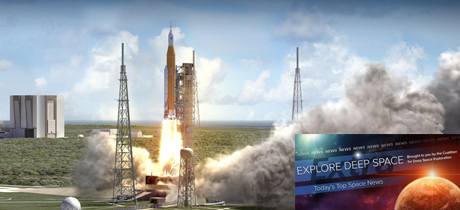In Today’s Deep Space Extra… U.S. Senate 2018 NASA budget continues to unfold, including funds to upgrade Kennedy Space Center launch facilities for the Space Launch System, which along with Orion is to start U.S. astronauts on future missions of deep space exploration.
Human Space Flight
Proposed budget gives KSC a boost toward Mars
Florida Today (7/27): The U.S. Senate Appropriations Committee on Thursday approved $19.5 billion in spending for NASA in 2018, a measure that includes $640 million in upgrades to launch facilities at the Kennedy Space Center involved in launches of the Space Launch System and Orion spacecraft with astronauts assigned to future missions of deep space exploration. The measure awaits consideration by the full Senate.
Russian Soyuz, with 3-man crew, set for Friday trip to Space Station
CBS News (7/27): Three U.S, European and Russian astronauts were set to launch Friday aboard the Soyuz M-05 for the International Space Station. Randy Bresnik, Paolo Nespoli and Sergey Ryazanskiy should dock around 6 p.m., restoring the orbiting lab to six person operations for the first time in nearly two months. The linkup will increase from three to four the number of astronauts living and working aboard the Station’s U.S. segment, which should translate into a significant increase in scientific research.
For record-breaking astronaut Peggy Whitson, space is never boring
Space.com (7/27): Whitson has more career time in space than any American and the most of any woman, 629 days and counting. Whitson believes she’s succeeded because of a positive attitude. “I think if you have the right attitude, you can stay in space for a long period of time, and it’s actually very satisfying and enjoyable,” she told the Guinness Book of World Records in an interview earlier this week.
Space Science
Astrobotic to launch first lunar lander on Atlas 5
Space News (7/27): Coalition Member in the News – Pittsburgh based Astrobiotic will dispatch its first commercial lunar lander in 2019 atop a United Launch Alliance Atlas 5 rocket. Astrobiotic’s Peregrine will transport 35 kilograms of multinational payloads to the moon’s surface as an Atlas 5 secondary payload.
Cassini finds that Titan is building the chemicals that might have led to life on Earth
Universe Today (7/27): Carbon chain anions found in the atmosphere of Saturn’s moon Titan may be the chemical ingredient that helped to give rise to life on Earth, according to a multinational team that has assessed data gathered by the long running Cassini mission spacecraft. The NASA/European/Italian space agency probe has been orbiting the ringed planet since 2004.
Cameras on NASA exoplanet spacecraft slightly out of focus
Space News (7/28): NASA’s Transiting Exoplanet Survey Satellite, planned to launch no earlier than March 2018, is to search for Earth like planets around nearby stars. Mission planners believe the recent discovery that the future Earth orbiting satellite’s optics will be slightly out of focus when it cools down in space will not alter the overall mission.
Astronomers spot best views ever of gamma-ray burst
USA Today (7/27): Using space and ground based telescopes, astronomers now have their best observations yet of a powerful gamma ray burst. The chance observations of GRB160625B were published in the journal Nature.
Other News
Russia sanctions bill clears Congress
Spacepolicyonline.com (7/28): NASA activities with Russia and space launches conducted for NASA are exempted from U.S. Senate legislation imposing sanctions against Russia and approved Thursday. The measure matches legislation approved by the House earlier this week. The legislation, if signed by the president, will impose sanctions against Russian individuals and entities due to Russia’s interventions in Ukraine and for “undermining cybersecurity.” Russia is the only International Space Station partner capable of transporting astronauts to and from the International Space Station. Imported Russian rocket engines power Atlas 5 and Antares launch vehicles that carry out NASA contracted missions.
Senate restores funding for NASA Earth science and satellite servicing programs
Space News (7/27): The U.S. Senate Appropriations Committee on Thursday advanced a 2018 NASA budget measure, legislation that emerged from a Senate appropriations subcommittee earlier this week. The top line, $19.529 billion, matches the subcommittees. However, it also restores Earth science mission spending that the White House planned to cancel as well as a satellite servicing initiative.
Iran claims launch of satellite-carrying rocket into space
Associated Press via New York Times (7/27): In a move labeled “provocative” by the U.S. State Department, Iran launched its most advanced rocket yet for satellite launches. The Simorgh rocket is capable of carrying a 550 pound payload.

